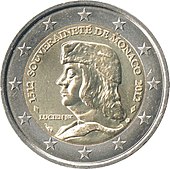Lucien (Monaco)
Lucien of Monaco (* 1481 ; † August 22, 1523 ) from the Grimaldi family was lord of Monaco from 1505 until his death .
Lucien was the third eldest son of Lambert von Monaco and Claudine Grimaldi . After the death of his father, Lucien's older brother Jean II took over the rule. On the night of October 10-11, 1505, Lucien stabbed his brother in self-defense during an escalating argument. The feudal lord, the Duke of Savoy, recognized this as self-defense and sent Lucien the official written remission on March 13, 1506.
Since the second eldest son of Lambert von Monaco was mentally handicapped, Lucien took over the rule as the successor to his brother Jean. Briefly tried the French King Louis XII. to prevent the succession through the "fratricide" and withdrew Lucien from the governor post of Ventimille , which Jean had held. However, at the end of 1506 the French king recognized Lucien as Lord of Monaco and appointed him chamberlain .
From January 1507, Monaco was besieged by Genoese troops for 100 days . The Genoese had driven the ruling patricians out of the city and instead appointed the dyer Paul de Novi as doge . He had declared the conquest of Monaco to be one of his most important tasks.
With the help of Piedmontese and French troops, Lucien succeeded with 600 men in a great battle on March 19, 1507, to drive out the 12,000 men of the Genoese. The price was the almost complete destruction of the fortress and devastation of the port.
In the same year, Louis XII tried to acquire Monaco. He had Lucien thrown in jail. Lucien's brother, Bishop Augustin , who then took over the administration of Monaco, had experts come to assess the value of Monaco. The result was a value of 166,000 ducats, which Ludwig could not afford. Augustine did not agree to the exchange of Monaco for other fiefs either. In May 1508, Lucien was released on payment of 4,000 ducats to the Duke of Milan.
King Ludwig XII. gave in and made Lucien swear only eternal loyalty and an eternal alliance with the crown of France. In return, Lucien received an annual pension of £ 500. Incidentally, Monaco's independence was confirmed in 1512: in the royal patent letters from Blois it is stated that Monaco is not held by anyone except God and sword .
Lucien signed some contracts. With Tuscany he mutually agreed free shipping. King Ferdinand V of Aragon, Naples and Mallorca granted Monaco similar rights.
In 1514, Lucien married Jean de Pontevès-Cabane from Provencal nobility.
Lucien's nephew Barthélémy Doria de Dolceacqua planned, possibly with the support of his cousin Andrea Doria , to murder Lucien and to take over the rule himself. On August 22, 1523 Barthélémy embarked in Ventimille, Lucien granted him hospitality in Monaco. Barthélémy managed to cut Lucien's throat with a knife. In the subsequent tumult, however, Barthelemy was driven out of the country by the people of Monaco.
After Lucien's death, his brother Augustin , Bishop of Grasse , took over the heir in regency for Honoré , Lucien's underage son.
literature
- Françoise de Bernardy: Princes of Monaco: the remarkable history of the Grimaldi family. Barker, London 1961, OCLC 946448828 .
- Maurizio Ulino: L'Età Barocca dei Grimaldi di Monaco nel loro Marchesato di Campagna. Giannini editore, Napoli 2008, ISBN 978-88-7431-413-3 .
- AM Brzeziński: Historia Monako. In: Józef Łaptos, Andrzej Maciej Brzeziński: Historia małych krajów Europy: Andora. Liechtenstein. Luxembourg. Malta. Monaco. San Marino. Ossolineum, Wrocław 2002, ISBN 83-04-04590-7 , pp. 398-401.
- Anne Edwards, Halina Wrońska-Zwolińska: Ród Grimaldich z Monako. Rachocki, Pruszków 1995, ISBN 83-86379-02-2 , p. 453.
Web links
- Postage stamps on Lucien
- History of the founding of the Principality and Lucien on members.tripod.com (English)
| predecessor | Office | successor |
|---|---|---|
| Jean II |
Lord of Monaco 1505–1523 |
Augustine |
| personal data | |
|---|---|
| SURNAME | Lucien |
| ALTERNATIVE NAMES | Grimaldi, Lucien |
| BRIEF DESCRIPTION | Lord of Monaco (1505–1523) |
| DATE OF BIRTH | 1481 |
| DATE OF DEATH | August 22, 1523 |

